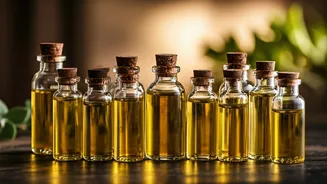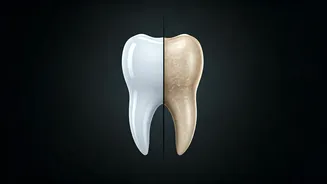Introduction: Hair Oil Power
Hair oils have been a cornerstone of beauty rituals for centuries, particularly in India. Their popularity stems from their ability to nourish the scalp,
strengthen hair follicles, and promote growth. Understanding the properties of different oils is key to choosing the right ones for your hair type and concerns. This guide will highlight ten exceptional oils and delve into their specific advantages for achieving long and thick hair. These oils can tackle different hair problems, providing solutions and making your hair beautiful and healthy. Integrating these oils into your hair care routine can lead to remarkable and visible improvements.
1. Argan Oil's Magic
Argan oil, often called 'liquid gold,' is rich in antioxidants, vitamin E, and fatty acids. These nutrients work together to hydrate the hair, reduce breakage, and protect against environmental damage. Its lightweight texture allows for easy absorption, making it suitable for all hair types. Regular use of argan oil can improve hair elasticity, reduce frizz, and add a healthy shine, thus encouraging longer and thicker hair growth. Consider applying a small amount to your hair after showering to seal in moisture and provide heat protection. Its ability to repair split ends and revitalize damaged hair makes it a popular choice. The oil also acts as a natural conditioner and aids in detangling, thus reducing hair fall.
2. Coconut Oil's Wonders
Coconut oil, a staple in many Indian households, is known for its deep moisturizing properties. It penetrates the hair shaft more effectively than many other oils, preventing protein loss and reducing hair breakage. This characteristic makes coconut oil excellent for strengthening the hair from within. The saturated fats in coconut oil help retain moisture, preventing dryness and brittleness, which are common causes of hair fall. Using coconut oil regularly can improve scalp health, reduce dandruff, and stimulate hair growth. For best results, warm the oil slightly and massage it into your scalp, leaving it on for at least 30 minutes before washing your hair. This oil is a powerhouse for overall hair health.
3. Castor Oil's Boosting
Castor oil is celebrated for its ability to promote hair growth. Rich in ricinoleic acid, it boosts blood circulation to the scalp, which encourages hair follicle stimulation. This, in turn, can help in growing thicker and longer hair. Castor oil is thick and sticky, so it is often diluted with a lighter oil like coconut or almond oil for easier application. It is also known to have antibacterial and antifungal properties, which help to maintain a healthy scalp and prevent infections. Consistent use can lead to stronger, healthier hair with reduced breakage. Regular scalp massages with castor oil are often recommended to maximize its benefits and stimulate the hair follicles for optimum growth and volume.
4. Jojoba Oil's Versatility
Jojoba oil is unique because its molecular structure is similar to the natural oils produced by the scalp (sebum). This means it is easily absorbed and effectively moisturizes the hair without leaving it greasy. Jojoba oil is non-comedogenic, meaning it won't clog pores, making it suitable for all hair types. It helps balance oil production on the scalp, which can reduce dandruff and promote a healthy environment for hair growth. Applying jojoba oil can improve hair's elasticity, reduce breakage, and add shine. Using it as a leave-in conditioner or pre-shampoo treatment can enhance its effectiveness. Its lightweight nature makes it an excellent choice for daily use, keeping the hair hydrated and promoting healthy growth.
5. Almond Oil's Benefits
Almond oil is rich in vitamin E, which is essential for healthy hair growth. It also contains magnesium, which helps reduce hair breakage and split ends. Regular use of almond oil can strengthen hair, making it less prone to damage and promoting thickness. It is easily absorbed and can moisturize the hair shaft, reducing dryness and improving overall hair texture. Sweet almond oil is particularly gentle and can be used on sensitive scalps. Massage almond oil into your scalp to stimulate blood circulation and encourage hair growth. Incorporate it into your hair care routine for improved shine, reduced frizz, and stronger, healthier hair. It has a mild scent and is a great all-around choice for hair health.
6. Olive Oil's Strength
Olive oil is packed with antioxidants and vitamins, particularly vitamin E, which is excellent for hair health. It moisturizes the hair, reduces dandruff, and promotes hair growth. The oleic acid in olive oil penetrates the hair shaft, improving its strength and elasticity. This helps to reduce hair breakage and split ends, thus promoting thicker and longer hair. It is also effective at softening and conditioning hair, leaving it smooth and manageable. Warm olive oil before applying it to your hair to enhance its absorption and effectiveness. Regular use of olive oil can improve the overall health of your hair, providing a natural shine and encouraging healthy growth. It is a time-tested remedy for hair care.
7. Rosemary Oil's Stimulation
Rosemary oil is known for its stimulating properties, promoting blood circulation in the scalp and thus, promoting hair growth. It can help prevent premature greying and may also reduce hair loss. It is often used to treat thinning hair, stimulating the follicles and encouraging new growth. Rosemary oil should always be diluted with a carrier oil like coconut or jojoba oil before applying it to the scalp. Massaging diluted rosemary oil into the scalp regularly can significantly improve hair thickness and volume. Regular use is known for its potent ability to reduce hair fall and promote hair growth, making it a great choice for those aiming for thicker and healthier hair.
8. Tea Tree Oil's Healing
Tea tree oil has antiseptic, antifungal, and antibacterial properties, which make it useful in treating scalp conditions like dandruff and itchiness. A healthy scalp is crucial for hair growth, and tea tree oil helps create the perfect environment for it. It can unclog hair follicles, allowing the hair to grow freely. However, tea tree oil must always be diluted before use, as it can be irritating if applied directly. Mixing it with a carrier oil like coconut or olive oil can enhance its benefits. Regular use of tea tree oil on the scalp can alleviate issues and encourage healthy hair growth. It effectively addresses scalp issues to promote healthy hair from the root.
9. Grape Seed Oil's Lightness
Grape seed oil is lightweight and non-greasy, making it perfect for all hair types. It is rich in antioxidants, which protect hair from environmental damage and promote hair health. It also contains linoleic acid, which helps to moisturize the hair and prevent dryness. Grape seed oil is easily absorbed and won't weigh the hair down, making it suitable for those with fine or oily hair. Regular use can improve hair's shine, reduce frizz, and encourage growth. It helps in strengthening the hair follicles, thus promoting healthier and thicker hair. This makes it an ideal choice for everyday hair care.
10. Brahmi Oil's Revitalizing
Brahmi oil is an Ayurvedic remedy known for its hair-strengthening and revitalizing properties. It strengthens the hair roots, reduces hair fall, and promotes hair growth. Brahmi oil is known for its cooling properties and can soothe the scalp, which helps in reducing stress-induced hair fall. It also helps to prevent split ends and improve overall hair texture. Regular use of Brahmi oil improves blood circulation in the scalp, fostering healthier hair growth. Massaging Brahmi oil into the scalp can provide a calming effect while encouraging longer and thicker hair. It is a well-known secret for thicker, shinier hair and a healthy scalp in traditional Indian hair care practices.













